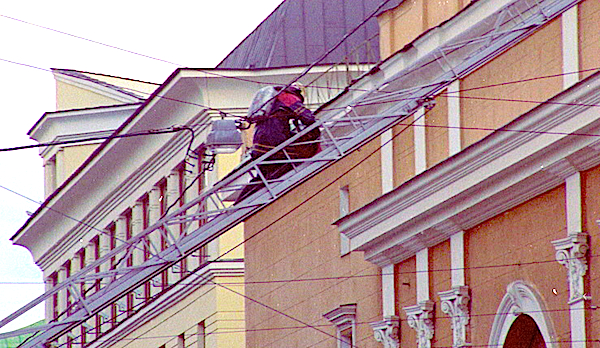To Russia with Music, 2003
To Russia with Music, June 2003
The energies of the Vancouver Welsh Men's Choir in its 23rd season were focussed on preparing for a concert tour of the two great cities of Russia - Moscow and St. Petersburg in June of 2003. These two cities have such a rich cultural history of art, dance and especially music which goes back over three centuries that it was a great challenge and a source of inspiration and excitement for the choir. The VWMC sang in places where some of the greatest European composers and musicians have graced the concert halls, operas and ballet theatres. It was a challenge, but the VWMC met large and responsive audiences everywhere we performed.
This tour opportunity presented itself in July 2000 when our Performance Chair, Ken Rogerson, received an official invitation from the Russian Ministry of Culture requesting that our choir be part of the cultural festivities celebrating the 300th Anniversary Celebration of the founding of St. Petersburg by Czar Peter the Great in 1703. We learned through their agents in North America, the International Fine Arts Institute of Milwaukee, Wisconsin that we and one other amateur Canadian musical organization were selected by the Russian government to receive invitations because of the fine quality of our recordings and performances, our successful history of international tours, and our demonstrated ability to be good ambassadors for Canada.
Sixty-two singers, Music Director John Trepp, accompanist David Buchan and soloist Jonathan Quick accompanied by ninety wives, friends and relatives embarked on June 10th for a gruelling flight to St. Petersburg via Air Canada to London and a chartered aircraft from London to St. Petersburg.

Pulkovo charter from London to St. Petersburg (Don Blake photo)
Our first performance was June 12th in the Grand Philharmonic Hall. We began with our first ever selection sung in Russian - the Russian national anthem. The audience was exceptionally responsive to our gesture of recognition and respect. By the time we had performed another couple of their favourites (in English this time), including En Route, a song made famous by the Red Army Chorus, they were ecstatic.
The next day began with a guided tour of the Peter and Paul Fortress on one of the many islands making up the city of St. Petersburg. Our tour included the church on the site and a choral treat - listening to chant by a group of Orthodox monks. That night we performed at the Glasunov Concert Hall at the St. Petersburg State Conservatory to another sold out house.

Peterhof, summer palace of the tsars (Don Blake photo)
Saturday, June 14th, after another sumptuous buffet breakfast at our hotel, we boarded the buses for a guided tour of Peterhof, the tsars' summer palace. This was an extraordinary experience. The palace had been almost completely destroyed during the World War II siege of St. Petersburg, but has been completely rebuilt to the original design. That evening we were treated to a Russian Folk Show, including a performance by a mini Red Army chorus.

Sunday service at Evangelical Baptist Church
(Mary Batten photo)
A special experience in St. Petersburg was our appearance at the Sunday service in St. Petersburg Evangelical Baptist Church. Located in a suburb of St. Petersburg, the church attracted a largely working class congregation. The service was conducted entirely in Russian so virtually none of us understood what was going on except to recognize the cues when we were asked to sing hymns. After the service we were literally mobbed as people expressed their thanks for our visit to their church.

Hermitage Museum, St. Petersburg (Don Blake photo)
That afternoon was spent in the world famous Hermitage. We had only 3.5 hours so were only able to sample the delights this fabulous museum has to offer.

Annunciation Cathedral, Kremlin (Don Blake photo)
Monday, June 16th saw us head to Moscow. Again, our group was so large that we required two planes for the trip. The hotel was not up to the standard of what we experienced in St. Petersburg (our Moscow hotel was built to house athletes for the 1980 Olympic Games), but the opportunity to visit some of that city's cultural and political landmarks more than made up for it. These included the Tretyakov Russian Art Gallery, the Kremlin and Poklonnaya Gora, the museum reflecting the incredible hardships and carnage experienced by Russia during World War II. One of the biggest challenges facing our group was negotiating Moscow's notorious traffic.

"run for your life" crosswalk sign, Moscow (Don Blake photo)

Moscow firefighter threading through wires
(Don Blake photo)
Our only disappointment brought with it another special experience - being forced to evacuate the theatre where we had been eagerly awaiting a performance of the classical Russian ballet, Giselle. Instead, we had a special vantage point as we watched the Moscow fire department negotiate narrow streets, dangling power lines and other obstacles as they extinguished the fire that had broken out in the theatre's costume and props area and gutted the upper two floors of the theatre. Click here for an eyewitness account from a choir member.
June 20th, ten eventful days after leaving Vancouver, it was time to return home. Our wakeup call came at 2:00 am (some of us didn't bother to sleep). We boarded the buses at 3:00 am, reflecting on another unforgettable trip with the Vancouver Welsh Men's Choir.

